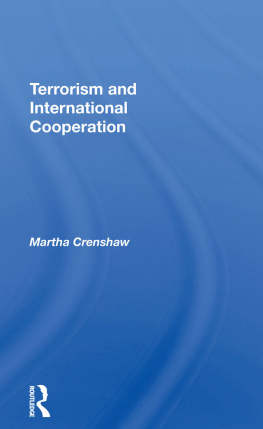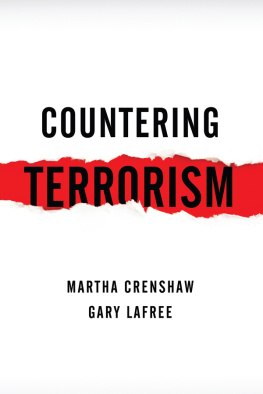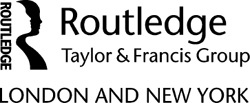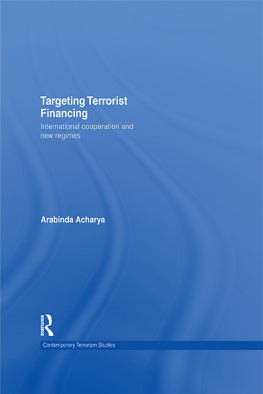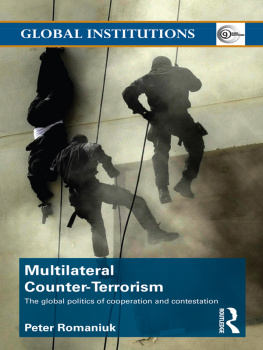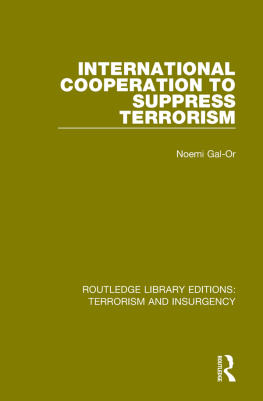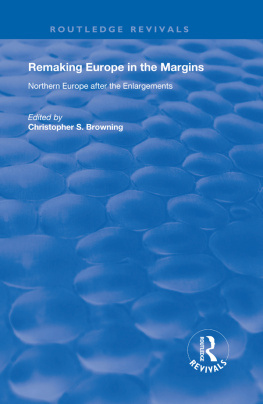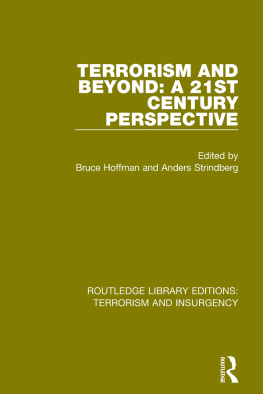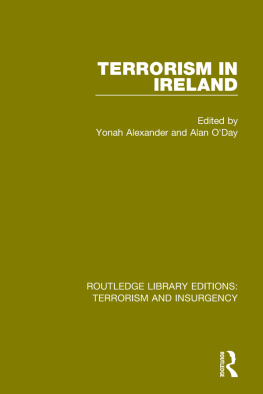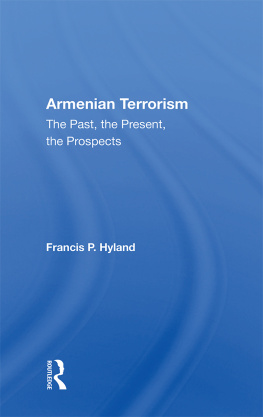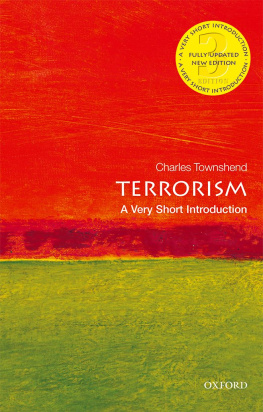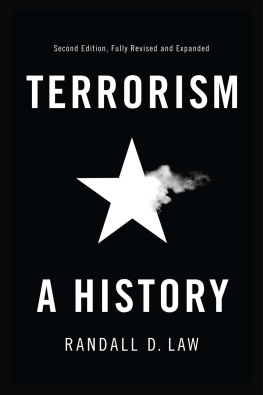Occasional Paper Series 11
Terrorism and International Cooperation
Martha Crenshaw
First published 1989 by Westview Press, Inc.
Published 2019 by Routledge
52 Vanderbilt Avenue, New York, NY 10017
2 Park Square, Milton Park, Abingdon, Oxon OX14 4RN
Routledge is an imprint of the Taylor & Francis Group, an informa business
Copyright 1989 by the Institute for East-West Security Studies, Inc., New York.
All rights reserved. No part of this book may be reprinted or reproduced or utilised in any form or by any electronic, mechanical, or other means, now known or hereafter invented, including photocopying and recording, or in any information storage or retrieval system, without permission in writing from the publishers.
Notice:
Product or corporate names may be trademarks or registered trademarks, and are used only for identification and explanation without intent to infringe.
Library of Congress Cataloging-in-Publication Data
Crenshaw, Martha.
Terrorism and international cooperation/by Martha Crenshaw.
p. cm.
ISBN 0-913449-11-3 (Institute): $7.95.ISBN 0-8133-7797-8 (Westview)
1. Terrorism.. 2. TerrorismPreventionInternational cooperation. I. Title.
HV6431.C76 1989
363.3'2dc20
89-2132
CIP
ISBN 13: 978-0-367-28990-4 (hbk)
It was riot long ago that terrorism was considered a Western problem and a major obstacle to improving relations between the United States and the Soviet Union as well as between East and West. There was no consensus on what constituted a terrorist act and no acceptance of the proposition that East and West could seriously discuss cooperation in fighting terrorism.
The issue looks quite different in 1989. Despite strong skepticism in some quarters, prominent officials in Moscow and Washington have issued public proposals calling for discussions on possible East-West cooperation in combatting terrorism. Joint efforts against terrorism are being labeled potential confidence-building measures in East-West relations. It is now widely accepted that terrorism increasingly threatens the East as well as the West and that the potentially destabilizing effects of terrorism have the capacity to severely aggravate existing strains in the international order and undermine the continued improvement of East-West relations.
Terrorism causes alarm because it appears contagious across nations and regions and has spilled over from domestic arenas of conflict into world politics, threatening international commerce and diplomacy and frequently involving attacks on victims with no responsibility for the conditions supposed to motivate or justify violence. The issue of terrorism raises deep and troubling questions about the permissibility, effectiveness and limits of civil violence. It has caused a widening of divisions and suspicions between East and West, between North and South and between the United States and its NATO allies. As such, terrorism is a common problem which needs to be dealt with effectively and on a cooperative basis whenever possible. Unilateral responses to terrorism have proved insufficient. The changing international environment makes multilateral cooperation in fighting terrorism both more necessary and possible.
In this study Martha Crenshaw, Professor of Government at Wesleyan University and a 1987-1988 American Scholar-in-Residence at the Institute for East-West Security Studies, provides a thoroughly readable assessment of the nature of terrorism and the possibilities and conditions for international cooperation in combatting it. A former advisor on terrorism to the U.S. secretary of state, Dr. Crenshaw deals with an aspect of cooperation that until recently would have been considered highly controversial, if not unthinkablethe possibility of East-West cooperation against terrorism. She concludes that such a possibility exists and that, in fact, there already is significant ongoing East-West cooperation to prevent terrorists from acquiring nuclear devices. She considers that under General Secretary Mikhail Gorbachev, a Soviet interest in pursuing cooperative measures has been expressed with some insistence, and that the United States could benefit from this apparent change of attitude. Under the Bush administration, the issue of possible cooperation in combatting terrorism has in effect been placed on the agenda for East-West talks.
Dr. Crenshaw calls for the development of a pragmatic approach to countering terrorism, based on an objective definition of the threat and realistic analysis of the wider political context within which it occurs. She recommends the isolation of terrorism as unacceptable regardless of its political motivation, and that cooperation in the battle against terrorism should be rewarded and noncooperation punished. Dr. Crenshaw warns against inflated expectations of the immediate gains from international cooperation in combatting terrorism. Terrorism can be reduced but not eradicated. Progress is likely to be incremental rather than comprehensive, and national efforts from all sides must be based on recognition of the difficulties inherent in dealing with a highly complex and troublesome political problem that is too often oversimplified.
Martha Crenshaw wrote this study while an American Scholar-in-Residence at the Institute for East-West Security Studies in New York during 1987-1988. The study was exposed to the critical review of the Institute's 1987-1988 Fellows research team, which was composed of security specialists from Eastern and Western Europe and the United States. The author would like to thank the 1987-1988 Fellows as well as the academic staff of the Institute, including in particular Vice President and Director of Studies F. Stephen Larrabee, Deputy Director of Studies Allen Lynch and Research Associate Ian Cuthbertson, for their valuable comments and critiques. She would also like to thank Institute Director of Publications Peter B. Kaufman and Publications Editor Mary Albon for devoting much time and effort to guiding the manuscript through all stages of production.
The author's fellowship at the Institute was made possible by the generous support of the Ploughshares Fund of San Francisco. The Institute also gratefully acknowledges the funding of the Ford Foundation and the John D. and Catherine T. MacArthur Foundation for the publication and distribution of this Occasional Paper. The views in this study are solely those of its author and should not be ascribed to the Institute or its funders. The Institute for East-West Security Studies is pleased to sponsor the publication of this Occasional Paper on a subject that could become a confidence-building effort between East and West rather than remaining a destabilizing and negative force as in the past.
John Edwin Mroz
President
April 1989
1
Introduction
The American foreign policy community is actively engaged in a review of U.S. diplomacy toward the Soviet Union, a reaction to Soviet "new thinking" as well as to the opportunities for new American foreign policy initiatives that coincide with presidential election years. The idea that terrorism might be an area of possible cooperation between East and West at first seems unlikely, given the propensity of both sides to use the term as a label for condemning the policies of the other. However, the issue has been raised as a potentially fruitful topic for East-West dialogue not only by the Institute for East-West Security Studies but by other knowledgeable observers. For example, Zbigniew Brzezinski, speaking to the Trilateral Commission in 1986, recommended that terrorism be placed on the East-West agenda because of its potential for creating discord in the Western alliance. According to Brzezinski, not present changes in the Soviet outlook but past Soviet responsibility for embracing terrorism as a form of strategically beneficial disruption in the 1970s makes it important to include the issue in joint discussions. He urged the United States to move beyond the "simplistic activism" of past anti-terrorism policy, to recognize the complexity of its multiple layers of activities, but not acquiesce to the passivity of the West Europeans. In addition, in January 1989 private American foreign policy specialists met with several Soviet counterparts in Moscow to recommend common measures against terrorism.


